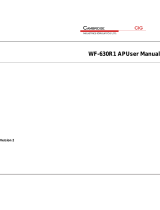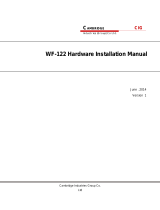Page is loading ...

HOB D33 S PRODUCT DESCRIPTION SHEET
GB
5019 619 62005/B
To get full satisfaction from the hob, please read these instructions carefully and keep them for future consultation.
ITPT ES GB
LIGHTING THE BURNERS
• To ignite one of the burners, turn the relative knob anti-clockwise to the maximum flame setting .
• Press the knob against the control panel to ignite the burner.
• After the burner has ignited, keep the knob pressed for about 5 seconds to allow the thermocouple to warm up.
This burner safety device shuts off the gas supply to the burner if the flame goes out accidentally (because of sudden
draught, an interruption in the gas delivery, boiling over of liquids, etc.).
• The device must not be pressed for more than 15 sec. If, after that time has elapsed, the burner does not
remain lit, wait at least one minute before trying to light it again.
- The burner might go out when the knob is released. This means that the thermocouple has not warmed up enough.
In this case, repeat the operations described above.
PRATICAL ADVICE FOR USING THE BURNERS
For better burner performance, please stick to the following
rules:
- Use pots and pans that fit the burners (see table on the
right).
- Only use flat-bottomed pots and pans.
- Use the correct amount of water for cooking foods and
keep the pot covered.
1.
Removable pan grid
2.
Ultra rapid Burner
3.
Ultra Rapid Burner control knob
SYMBOLS
Tap closed
Maximum flame
Minimum flame
Burner Pot Ø
Ultra rapid
from 24 to 26 cm
DIMENSIONS AND DISTANCES TO BE MAINTAINED (mm)
NOTE: In case of installation of a hood above the cooktop, please refer to the hood instructions for the correct
distance.
INJECTOR TABLE CATEGORY II2H3+
ELECTRIC SUPPLY: 230 V - 50 Hz
Type of gas used Type of burner Ø injector Rated thermal
flow rate kW
Rated
consumption
Reduced heat
capacity kW
Gas pressure (mbar)
min. rat. max.
NATURAL GAS
(Methane) G20
ultra rapid 136 3.50 333 l/h 0.60 17 20 25
LIQUID
PETROLEUM GAS
(Butane) G30
ultra rapid 94 3.50 254 g/h 0.60 20 28-30 35
LIQUID
PETROLEUM GAS
(Propane) G31
ultra rapid 94 3.50 250 g/h 0.60 25 37 45
Type of gas used Configuration model Rated thermal flow rate
kW
Total rated consumption Air necessary (m
3
) for the
combustion of 1 m
3
of gas
G20 20 mbar 1 burner 3.5 333 l/h 9.52
G30 28-30 mbar 1 burner 3.5 254 g/h 30.94
G31 37 mbar 1 burner 3.5 250 g/h 23.8

PRECAUTIONS AND GENERAL ADVICE
To get full satisfaction from your hob, please read these instructions carefully and keep them for future consultation
• These instructions are only valid for those Countries where the destination abbreviations are mentioned on the product
description sheet and on the hob.
• Keep the packaging material (plastic bags, polystyrene parts, etc.) out of the reach of children, as they are potentially
dangerous.
• Check whether the hob has been damaged during transport and remove any protective film from the appliance parts.
• This hob (Class 3) is designed solely for household use for cooking food. Any other use (such as heating
rooms) is to be considered improper and, as a consequence, dangerous.
• Ensure that the installation and gas/electrical connections are performed by a qualified technician in
compliance with current local safety regulations.
• This appliance should only be installed and used in well-ventilated rooms, in accordance with current
regulations. Carefully read the instructions before installing and using this appliance.
• Gas adjustment and supply pressure are indicated on the rating plate located under the hob. If the
appliance is arranged for a type of gas different from that available, refer to the paragraph “Ajustment to
different types of gas”.
REFERENCE TO LOCAL REGULATIONS
Provision for ventilation
The room in which the appliance is installed must have an air supply to current
B.S. 5440 - Part 2
standards.
All rooms require a permanent vent in addition to the openable window.
If there are other fuel burning appliances in the same room
B.S. 5440 - Part 2
should be consulted to determine
the air vent requirements.
If the appliance is installed in a cellar or basement, it is advisable to provide an air vent of 65 cm, irrespective of
the room volume.
Gas Safety Regulations
The law requires that all gas appliances are installed by competent persons in accordance with the current gas
safety regulations. Failure to install appliances correctly may lead to prosecution.
It is in your own interest, and that of safety, to ensure that the law is complied with. The hob should be installed
in accordance with the
Gas Safety (Installation and Use) Regulations,
the
Building Regulations
issued by
the Department of the Environment and the
Building Standard (Scotland)
(Consolidation) Regulations,
issued by the Scottish Development Department.
In the G.B.,
CORGI
registered installers work to safe standards of practice.
Regulation for room ventilation
Note:
If the appliance is not equipped with safety devices on the burners (thermocouples), the air vents must be increased by
100%, and must be at least 200 cm
2
), in compliance with M.D. 21 April 1993.
Connection to gas supply
Before connecting the appliance, make sure that the gas supply system complies with standards
UNI-CIG 7129
and
UNI CIG 7131
.
Gas connection
The connection to the mains gas network or gas cylinder must be made using a rigid copper or steel pipe with fittings
complying with standards
UNI-CIG 7129
, or using a continuous-surface stainless steel hose complying with standards
UNI-CIG 9891
.
The maximum length of the hose is 2 m.
Pressure control valves must comply with standards
UNI-CIG 7432
.
Gas installations for household cookers must comply with the
REGULATIONS ON GAS INSTALLATIONS
IN INHABITED BUILDINGS,
published in the
B.O.E.
(Official State Gazette) No. 77
, of March 30, 1974.
Ensure that the installation and gas connections are performed by a qualified technician, following the manufacturer's
instructions and in compliance with current local safety regulations.
GB
IT
ES
PT
PROTECTING THE ENVIRONMENT
1.
Packaging
The packaging material is entirely recyclable, and is marked with the recycling symbol , which identifies it as a type of
material that must be sent to local waste-disposal centres.
2.
Product
This appliance is marked according to the European directive 2002/96/EC on Waste Electrical and Electronic Equipment
(WEEE).
By ensuring this product is disposed of correctly, you will help prevent potential negative consequences for the
environment and human health, which could otherwise be caused by inappropriate waste handling of this product.
The symbol on the product, or on the documents accompanying the product, indicates that this appliance may not
be treated as household waste. Instead it shall be handed over to the applicable collection point for the recycling of
electrical and electronic equipment.
Disposal must be carried out in accordance with local environmental regulations for waste disposal.
For more detailed information about treatment, recovery and recycling of this product, please contact your local city
office, your household waste disposal service or the shop where you purchased the product.
Declaration of conformity
• This hob has been designed, constructed and marketed in compliance with:
- safety requirements of EEC Directive “Gas” 90/396
- safety requirements of EEC Directive “Low voltage” 73/23
- protection requirements of EEC Directive “EMC” 89/336
- requirements of EEC Directive 93/68
• This hob is suitable for contact with foodstuffs, and complies with EEC Directive 89/109.
NOTES
:
• Improper use of the grids can result in damage to the hob surface. Do not position the grids upside down or drag them
across the hob.
• If the hob has a glass ceramic top, do not use:
- Cast iron griddles or terracotta pots and pans
- Heat diffusers (e.g. metallic mesh)
- Two cookers for the same pot
• In case of prolonged use, additional ventilation may be needed (opening a window or increasing the extraction force of
the hood).
• Keep children away from the hob when it is in use and do not let them play with the controls or any other appliance
parts.
Warning
: the protective rubber feet on the grids represent a chocking hazard for young children. After removing the
grids, please ensure that all the feet are correctly fitted.
•
Attention
: the glass lid (if provided) may shatter if overheated. Before closing it, make sure that all the burners are off.
After use, make sure that the knobs are in position OFF and close the main gas delivery or cylinder tap
INSTALLATION
TECHNICAL INFORMATION FOR THE INSTALLER
• This product can be embedded in a worktop 20 to 40 mm thick.
• If there is no oven beneath the hob, insert a separator panel that has a surface at least equal to the opening
in the work surface. This panel must be positioned at a maximum distance of 150 mm below the upper
surface of the work surface but, in no case less than 20 mm from the bottom of the hob. In the case that you
intend to install an oven beneath the hob, make sure that it is manufactured by Whirlpool and equipped
with a cooling system. The manufacturer declines all liability if another brand oven is installed beneath the
hob.
• Before installation, make sure that:
- the local gas delivery conditions (nature and pressure) are compatible with the settings of the hob (see the
rating plate and injector table).
- The outer surfaces of the furniture or appliances adjacent to the hob are heat resistant according to local regulations.
- Combustion products are discharged outdoors through specific hoods or wall and/or window mounted electrical fans.
- Continuous natural air circulation is ensured through a clear opening in a wall of at least 100 cm
2
. This wall opening must
be:
a) permanent and in a wall to the outside of the room to be vented;
b) made in such a way that it cannot be obstructed from the inside or outside (not even accidentally);
c) protected by plastic grids, metallic mesh, etc., taking care not to reduce the air vent effective area mentioned above;
d) located near floor level and positioned so as not to interfere with the operation of the exhaust system.
/

